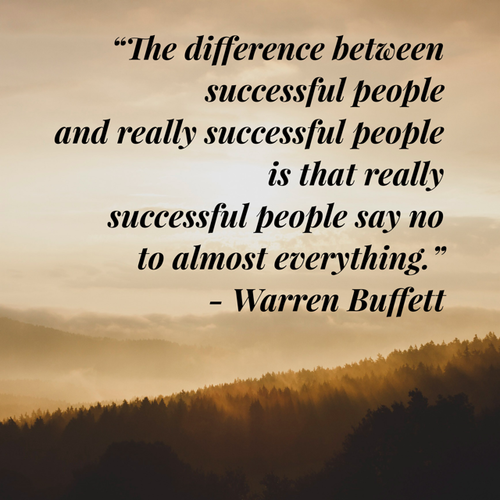by Carolyn Edlund
Serious creative entrepreneurs must stay focused to meet their business objectives and goals. That means saying “No” to what holds them back.

The most successful people in the world make a habit of turning things down. And they do it frequently. Everyone’s time is limited. How we make use of that precious time determines what we’re able to achieve.
As a business owner, you need to keep the big picture in mind. What is the vision you have for your business? Have you created a road map to get there? Break down the steps to reach your goals into manageable bite-sized pieces and prioritize them in a logical fashion. Then, execute. Keep your eye on the prize and refuse to get derailed by distractions.
Say No to:
Doing what could easily be delegated to others.
As the CEO of your art business, you are top management. As such, you should be working at your highest possible level as often as possible. You make the major decisions that impact everything – where you sell, how you market, who you seek out as part of your network.
What you don’t need to be doing is posting on social media for two hours a day, because someone else can handle those tasks (and they might do it better!) It’s easy to lapse into mindlessly scrolling through Instagram, and avoid the hard work of managing things. Are you spending most of your time on making a difference in your business, or holding yourself back?
Another aspect of your job is creating art, which requires your vision, your talent and your individual skills. Name those things that only you can do. Then take a look at other tasks. Sanding, assembly, packing and shipping are lower level skills that you can pay someone else to do for you.
Entrepreneurs who cannot let go of micromanaging every detail won’t have time for the important stuff. Deciding to hire help can be stressful. It means you’ve made the commitment to work at the top of your game, and you’ll need to earn income to pay for assistance. But almost every artist I’ve spoken to who took this step was happy they did.
Taking on projects to please other people.
It’s easy to be pulled off task because someone else wants you to spend your time doing something else for them. This usually involves money. You might be approached to teach a summer class rather than working on an inspired new body of work. Should you take the job, or Say “No”?
It can be hard to turn down cash in favor of pursuing your dream and fulfilling your business vision. But will it mean you are spending your time helping someone else fulfill their vision instead? Which is more important?
Say “No” to those distractions (even when they come with a paycheck) that will send you off course, eat up your time or take you away from reaching your own goals.
Changing the focus of your work to fit requirements.
An artist I know recently mentioned that she was pursuing a grant opportunity. As we discussed the details, it turned out that she would have to seriously compromise her artistic vision and even change her usual materials to meet the grant requirements. She ultimately realized that it’s more important to find opportunities that align with her vision than twist herself into a pretzel to accommodate something that’s not a perfect fit.
Once you’ve made a commitment to pursue what really interests and inspires you, vet any opportunities that come along to make sure they will help you move forward and not become a distraction. When you have clarity on your concept and the purpose of your work, you can more easily make those decisions.
What have you said “No” to lately?




This is an article I definitely need to SAVE and refer to often! Thanks for the reminder!!
Glad you said yes to saying NO!
Dear Carolyn,
As it happens I had just written a very firm letter to my agent very specifically saying “no” to them when your post came to my inbox. I howled with glee at how the Universe can sometimes give us just the right support when we need it.
The story: I had recently accidentally discovered that one of the clients we license my work to had produced a product that used an image we had previously licensed for a different product. My agent was trying to convince me that we should not “bother” this big company with such a trivial detail as demanding a new contract for the new product. I had to say that “No” he was wrong. We need a new contract for the new product so that we are all protected.
If I had not accidentally found that new product, and had licensed the image to a competing company (not knowing about their new product) , I would have been liable for the mistake and could have been sued. (It happened once before in just that way). So yes, sometimes we also have to say “No” even to our agents and good clients when they don’t understand how copyright law must be honored….or if they do understand and are hoping to get away with producing a new product without a contract just because we have an old contract covering other products in the same company.
So let’s hear it for good boundaries that are defined by good “yes” and “no” communications!
Thanks for sharing this, Sally. A big YES to your decision to not take this lying down! Contracts exist to clarify terms, protect all parties and ensure that you will get paid for your work, and I totally agree that you need this in writing. And I think your licensing agent will actually respect you more for standing your ground. They certainly won’t take things for granted in the future.
This is a great article!! I am a YES person at this point in my art business because I dont know which yes’ will result in income and which ones I should pass on. I am seeking a good licensing company to work with because I know I can’t do it all. Do you happen to have knowledge and resources in this area? Thank you for your work.